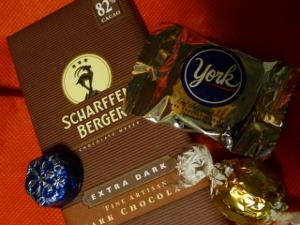Why is Chocolate Toxic to Pets?
- posted: Feb. 10, 2015

Happy Valentine’s Day!
With Valentine’s Day just around the corner, many of us will give or receive chocolates. Almost everyone knows that dogs and cats shouldn’t eat chocolate, but do you know why the sweet stuff is so toxic to our furry friends? The answer is quite a mouthful—methylxanthines. Methylxanthines are chemicals in chocolate like theobromine and caffeine. They are toxic because, unlike us humans, our pets’ bodies do not rapidly break down these compounds, so they remain in the body for a long time. These substances can cause mild, unpleasant symptoms like vomiting and diarrhea. But they can also have more serious effects like increased heart rate, seizures and even coma and death depending on the amount of methylxanthine present and on how much a pet eats.
Pure cocoa powder like that used for baking contains the highest levels of theobromine and caffeine at 800mg/oz. By comparison, milk chocolate has only 64mg/oz.
As little as one ounce of chocolate per pound of body weight can be lethal!
So, a full 10.5 oz. bag of Hershey’s Kisses could be fatal to a small dog or cat. In this part of Pennsylvania being so close to Hershey, many people use cocoa mulch in their gardens. This mulch made from cocoa bean hulls contains theobromine at as much as 265mg/oz. and can also be toxic to dogs and livestock if they ingest it (chocolate statistics taken from merckmanuals.com).
The toxic effects of chocolate can be seen within 6-12 hours after ingestion. We treat chocolate toxicity with supportive care such as IV fluids and medications to control abnormal heart rhythms and seizures if present. If the pet is seen within two hours after ingestion, we may give your pet a medication to make him throw up the chocolate and we may give activated charcoal by mouth to prevent further absorption of theobromine and caffeine.
So, even though chocolate is a tasty treat for us, now you know why our pets should never be given chocolate. If a pet accidentally ingests a very small amount, he or she is likely to be fine. But, remember that even small amounts of cocoa powder and other dark chocolates contain large amounts of methylxanthines and your pet, especially a small dog and cat, may not need to eat very much to become seriously ill. So remember to give your dogs and cats lots of hugs and kisses this Valentine’s Day, just not of the chocolate variety!
This blog brought to you by the Patton Veterinary Hospital, serving Red Lion, York and the surrounding areas.
Location
Patton Veterinary Hospital
425 E Broadway
Red Lion, PA 17356
